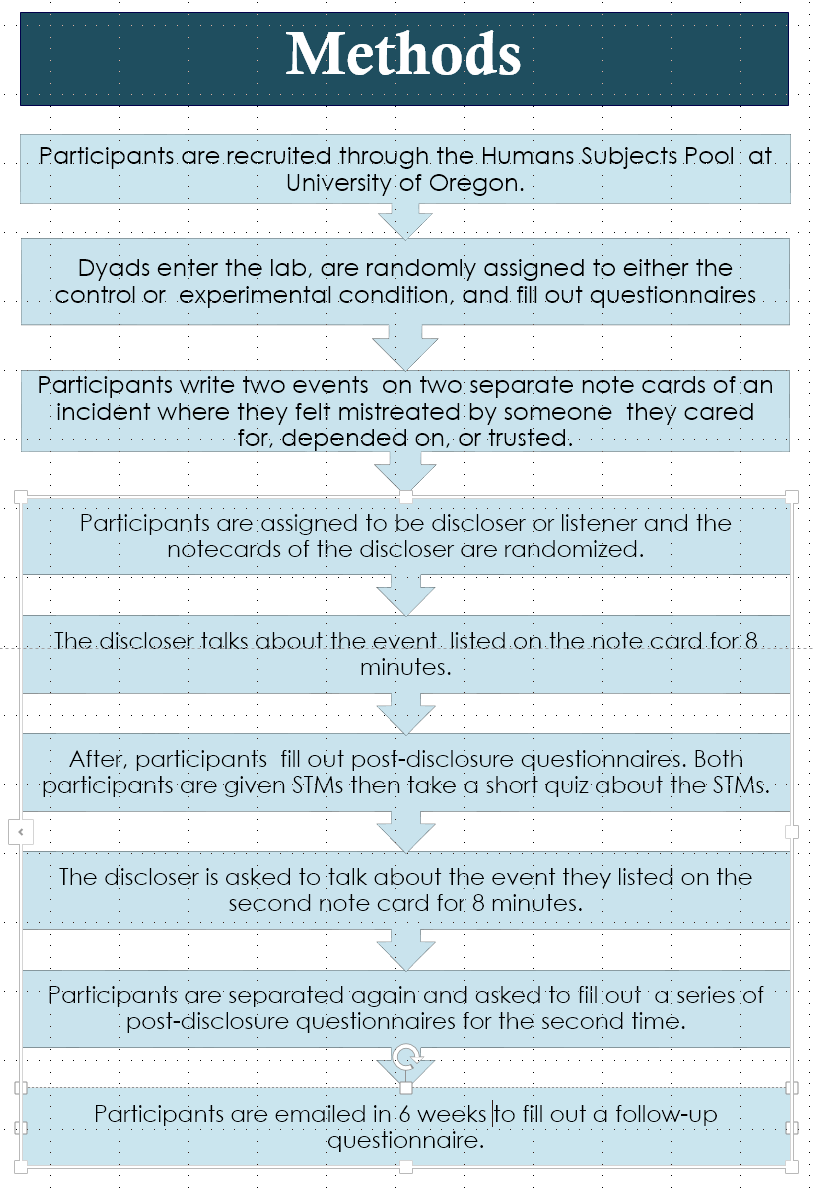About This Project
Negative reactions to a disclosure of mistreatment can be more emotionally detrimental to the discloser than not disclosing the event at all, while positive reactions to disclosures can yield significant benefits, such as desensitization towards negative feelings and thoughts (Radcliffe et al., 2010). This research will help participants learn listening skills in order to further understand the best ways to support someone during and after disclosure.
Ask the Scientists
Join The DiscussionWhat is the context of this research?
Importance of positive disclosure experience
Psychological and physical well-being of the person disclosing is largely influenced by the response that is received. Disclosure by itself does not necessarily lead to a positive impact on the survivor.
-Positive, supportive listener is needed
-Negative reactions lead to negative health outcomes
Reduced quality of life, role limitations, social functioning deficits, increased symptoms of depression and PTSD
What is the significance of this project?
When positive reaction/experience is received: 50% reduction in symptoms seen for women who have experienced interpersonal violence (Coker et al., 2002). In our pilot study, we hypothesized that the listening tips would have a long term, positive impact on the listeners' and disclosers’ self-rated ability to listen to disclosures of mistreatment, improve both participants' satisfaction in the relationship, and enhance participants’ self-reported listening skills through the listening tips learned during the study. Results indicated that participants who received the listening tips had lower ratings of unsupportive behaviors after the intervention in comparison to the control group who did not receive the listening tips at that time point.
What are the goals of the project?
We will be running pairs of participants in the lab and asking them to disclose two different events where they felt mistreated at some point in their lives. Between the first and second disclosure, we will be implementing the listening tips in order to see if there is a difference in how the listener responds to the second disclosure. We hope to continue spreading information about listening tips and find more platforms to share this information on.
Budget
In order to provide incentive for participants to take the follow-up survey after 6 weeks have passed, we are compensating them with $5 each after completion of the survey. For any participants who are not members of the University's Human Subject Pool, and do not receive any credit for a college course by participating in this study, we are entering these individuals into a drawing of gift cards in order to provide incentive for a more diverse sample.
Meet the Team
Jennifer Freyd
Jennifer J. Freyd, PhD, is Professor of Psychology at the University of
Oregon. Freyd directs a laboratory investigating the impact of interpersonal and institutional trauma on mental and physical health, behavior, and society. She has published over 150 articles and she is author of the award-winning Harvard Press book Betrayal Trauma: The Logic of Forgetting Childhood Abuse. Her new co-authored book Blind to Betrayal was published in English by John Wiley & Sons in March 2013. It has been translated into Traditional Chinese and Portuguese. Additional translations of her Blind to Betrayal into Simple Chinese, Russian, and Korean are in process. Freyd has received numerous honors including the Award for Outstanding Contributions to Science in Trauma Psychology from the American Psychological Associations’s Trauma Division. She is a Fellow of the American Psychological Association, the American Psychological Society, and the American Association for the Advancement of Science. She currently serves as the Editor of the Journal of Trauma & Dissociation.
Lab Notes
Nothing posted yet.
Additional Information

Project Backers
- 0Backers
- 0%Funded
- $0Total Donations
- $0Average Donation


